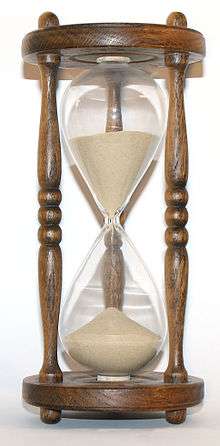Specious present
The specious present is the time duration wherein one's perceptions are considered to be in the present.[1] Time perception studies the sense of time, which differs from other senses since time cannot be directly perceived but must be reconstructed by the brain.
Description
The term was coined by E. Robert Kelly,[2] better known under the pseudonym "E. R. Clay".[3]
The relation of experience to time has not been profoundly studied. Its objects are given as being of the present, but the part of time referred to by the datum is a very different thing from the conterminous of the past and future which philosophy denotes by the name Present. The present to which the datum refers is really a part of the past—a recent past—delusively given as being a time that intervenes between the past and the future. Let it be named the specious present, and let the past, that is given as being the past, be known as the obvious past. All the notes of a bar of a song seem to the listener to be contained in the present. All the changes of place of a meteor seem to the beholder to be contained in the present. At the instant of the termination of such series, no part of the time measured by them seems to be a past. Time, then, considered relatively to human apprehension, consists of four parts, viz., the obvious past, the specious present, the real present, and the future. Omitting the specious present, it consists of three ... nonentities—the past, which does not exist, the future, which does not exist, and their conterminous, the present; the faculty from which it proceeds lies to us in the fiction of the specious present.[1]
The concept was further developed by philosopher William James.[3] James defined the specious present to be "the prototype of all conceived times... the short duration of which we are immediately and incessantly sensible". C. D. Broad in "Scientific Thought" (1930) further elaborated on the concept of the specious present, and considered that the Specious Present may be considered as the temporal equivalent of a sensory datum.
Finally, the claim of what precisely is being affirmed, in affirming the 'existence' of the specious present, is difficult to clarify. Philosophical theories of time do not usually interpret time to be in any unique way a production of human phenomenology, and the claim that we have some faculty by which we are aware of successive states of consciousness is trivially true.[4]
Notes
- James, W. (1893). The principles of psychology. New York: H. Holt and Company. Page 609.
- Anonymous (E. Robert Kelly), The Alternative: A Study in Psychology. London: Macmillan and Co., 1882.
- Andersen, Holly; Rick Grush. "A brief history of time-consciousness: historical precursors to James and Husserl" (PDF). Journal of the History of Philosophy. Archived from the original (PDF) on 2008-02-16. Retrieved 2008-02-02. Cite journal requires
|journal=(help) - "The Experience and Perception of Time". Retrieved 2009-10-22.
References
| Wikibooks has more on the topic of: Specious present |
- Andersen, Holly, and Rick Grush, "A brief history of time-consciousness: historical precursors to James and Husserl", To appear in the Journal of the History of Philosophy.
- Le Poidevin, Robin, "The Experience and Perception of Time", The Stanford Encyclopedia of Philosophy (Winter 2004 Edition), Edward N. Zalta (ed.)
- Hodder, A. (1901). The adversaries of the sceptic; or, The specious present, a new inquiry into human knowledge. Chapter II, The Specious Present. London: S. Sonnenschein &. Pages 36 – 56.
